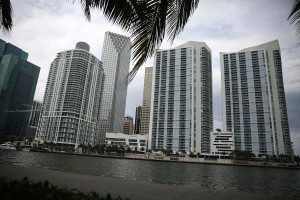
By Juan José Rodríguez
PANAMA City, Panama (AFP) — Alarm spread through Panama on Monday as concerns rose that a massive data leak from one of its legal firms could threaten its vital financial services sector that relies on offshore business.
President Juan Carlos Varela vowed that “what we are going to do is defend the image of our country,” while worried representatives from the financial and associated legal sector held an emergency meeting with the government.
The so-called Panama Papers leak has revealed that politicians, celebrities and criminals used the breached law firm, Mossack Fonseca, to create offshore entities for their assets — in some cases to illegally launder money or evade taxes.
The offices of Mossack Fonseca, which repeatedly denies any wrongdoing, were shut on Monday. Private security guards kept half a dozen news photographers and cameramen away from the mirrored building and its tidy front lawn.
One of the firm’s two founders, Ramon Fonseca, told AFP on Sunday that the leak of 11.5 million documents from his firm’s servers was the result of a “limited hack.”
But he called it a “crime” and an attack on Panama itself.
President Varela told reporters on Monday his government would “defend” the country’s reputation while cooperating with “whatever government and whatever investigation” following up on the building scandal.
His vice president, Foreign Minister Isabel De Saint Malo, earlier tweeted during a trip to Italy that “we regret (the) news at a global level that is affecting Panama.”
– Lawyers worried –
In a sign of how seriously Panama is taking the consequences from the leak, representatives from the lawyers’ association MAG and from the financial sector met with De Saint Malo’s staff in the foreign ministry on Monday.
Ministry officials told AFP that Fonseca was not among them.
MAG then called a news conference for early Tuesday to make a statement on the issue roiling its members.
Separately, the head of the Panamanian Lawyers’ Association, Jose Alberto Alvarez, told AFP in an interview on Monday that the Panama Papers fall-out went far beyond just Mossack Fonseca.
“The attack doesn’t only affect the firm, it affects (Panamanian) lawyers generally because it will tend to undermine the trust in our service,” he said.
“We see this as an attack on our entire system of services…. To that end, we lawyers are closing ranks to defend the core interests of Panama,” he said.
He also noted that there were around one million anonymous companies registered in Panama, and each of them paid an annual tax of $250 a year — meaning a fillip for the state of a quarter of a billion dollars a year.
Panama has worked in recent years to successfully get it taken off an international list of money-laundering tax havens.
Reforms included cracking down on the use of bearer bonds — shares that are owned by whoever physically holds the paper — as well as regulating free-tax zones, casinos, property, construction and money-change firms.
But its foot-dragging over lifting banking secrecy and automatically exchanging client financial information has nevertheless kept it in the sights of other nations, particularly the United States and in Europe.
– Panama, ‘the last major holdout’ –
“Panama is the last major holdout that continues to allow funds to be hidden offshore from tax and law enforcement authorities,” The OECD’s secretary general, Angel Gurria, said in a statement.
He said: “The ‘Panama Papers’ revelations have shone the light on Panama’s culture and practice of secrecy.”
Gurria, a Mexican economist, noted that, while the leaked data exposed “nefarious activities,” they also showed a decline in the use of offshore companies and bearer bonds, which he attributed to the OECD’s campaign against tax havens.
He said a G20 meeting of finance ministers from the world’s top economies in London next month “will be critical” in the push to eradicate banking secrecy and tax evasion.
© 1994-2016 Agence France-Presse







